When I was in middle school, a young version of myself was navigating through the dark woods of self exploration, finding out who I was, and what it meant to be a Black boy who liked other boys. Yes, homo. Exploring my identity, I often felt trapped in between two worlds: Blackness and queerness.
When I was with white kids, sometimes I would get made fun of because of the color of my skin: "Blackie," "Darkie" or turning off the lights and asking "Where'd Amiri go?" were comments that I experienced on the regular. When I was with Black kids, and I did not meet the standard of Black male masculinity, I would get made fun of because of my personality and character tendencies: "f****t," "sissy," "fairy," "girl," we some of the names they would use.
Before I came out, I spent many days alone, mentally isolated, thinking about what it really meant to be me, a Black gay man. The lonesomeness that occupied me as I felt displaced between Blackness and queerness was depressing. I thought to myself that it was hard to be both: a Black man and a gay man. And that was in part because I didn't see it.
Trending stories
\u201cBIPOC Highlight: Paris is Burning. This documentary is a beautiful time capsule of the "ball" culture of late '80s drag scene. It showcases intricate/gorgeous drag shows, but also the discrimination and fears during the AIDS fueled hysteria of the time.\u201d— PodCavern (@PodCavern) 1601653330
Often, I would try to search for pieces of myself and my sexuality in people who were out, loud, and confident -- but for me, that was often reduced to white, thin, cis, able-bodied men. I watched Glee just to see the scenes with Kurt and Blaine. I indulged myself in their queerness, but even still, the experience felt isolating: I knew that they experienced queerness differently than I did as a gay Black man.
I did not know about James Baldwin or his book, Giovanni's Room. I did not know about Bayard Rustin and his incredible work as an activist in The Civil Rights movement. I did not know about Paris is Burning and all of the Black and Brown queer people who danced until the sun rose in New York City before me. To me, these two parts of my identity felt like disparate ideas.
The result manifested in several ways: I often did not know how to cope with not only my own thoughts, but the anti-Black and homophobic ridiculing from my peers. And in truth, it wasn't always the words that people used against me, sometimes it was the absence of them. Not all homophobia is overt as it can also show up as a lack of support, love, and reassurance. But this isn't my experience alone, these feelings are reflected in data of other Black LGBTQ+ youth nationally.
In the Human Rights Campaign's 2019 Black & African American LGBTQ Youth Report, 80 percent of Black LGBTQ+ youth reported that they "usually" felt down or depressed, and only 35 percent feel like they can "definitely be themselves" at school.
Danielle Moodie-Mills, an LGBTQ+ advocate and founder of Poltini media writes that "The lack of GSAs [gay straight alliances] and other inclusive groups in predominantly black schools can be attributed to the commonly accepted notion that being gay or gender nonconforming is a 'white issue' as well as the 'don't ask, don't tell' policy that some black communities apply to people who are LGBT." This absence of intersectionality between Blackness and queerness, and lack of an emphasis from school administrations and youth leaders has very real consequences on Black queer youth.
As long as society does not see Blackness and queerness as experiences that co-exist, as long as queerness is seen as a "white thing," and there is an expectation of what Black-manhood is, Black LGBTQ+ youth will not be protected in the way that they deserve to be protected because they will continue to be left out of the conversation entirely.
When we fail to teach Black queer youth about how there always has been, and always will be Black LGBTQ+ people succeeding, writing, working, and existing in the world, we are denying them access to a part of their humanity. To exclude Blackness from queer representation is to alienate black youth: this can have detrimental consequences to their mental health.
\u201cRIP to Nigel Shelby. At 15 he took his own life due to constant horrific bullying for being gay. His school IGNORED his cries for help. He deserved to be loved & appreciated. When you say #BlackLivesMatter don\u2019t forget the LGBT ones.\u201d— Drebae (@Drebae) 1592495695
Nigel Shelby, a Black 15-year-old from Huntsville, Ala., died by suicide in April 2019. His story subsequently made headlines nationally. He was only in the 9th grade, and he was bullied for being gay. His school did nothing to prevent this.
In a released statement, his mother Camika Shelby said, "After my son passed, I learned that he had several discussions about homosexuality with school administrators and was told that being gay was a choice."
Imagine the difference it would have made if an adult told Nigel that they loved him, that he was valid in his Blackness and his queerness, if they had given him a hug, or told anyone who said anything remotely homophobic or anti-Black to him that those comments were intolerable. Justice for Nigel Shelby is a world where Black LGBTQ+ youth feel comfortable living in their own skin because no one makes them feel otherwise. Justice is the recognition that the intersectionality between Blackness and queerness is valid in every way.
Above: activist Amiri Nash giving a speech present day. Below: Nash as a young child.
If I could tell my younger self, who spent many nights crying about if he was too gay to be Black, or too Black to have a life as a gay man, anything: I would tell him that successful and happy Black queer people exist, that homosexuality is not just a "white thing," and that he deserves love for both parts of himself - that the intersectionality of the two is a beautiful thing -- that it is okay to be a Black boy who likes boys.
Amiri Nash (@uhmeeree) is an 18 year old activist, artist, and storyteller from Washington, D.C. He is the co-founder of the Sign of Justice project, and a first year student at Brown University. He is a GLAAD campus ambassador, and an avid pasta lover. He hopes to work towards reframing the American narrative to create a more inclusive society.









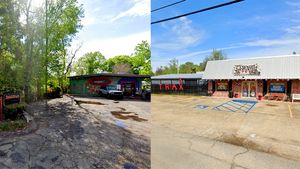



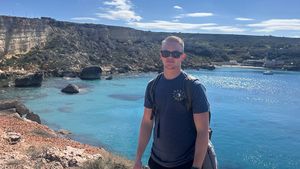







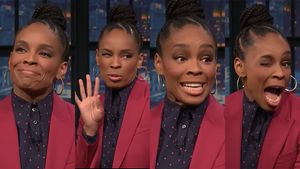





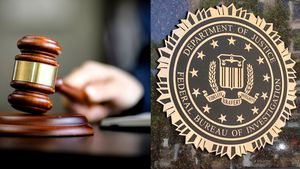

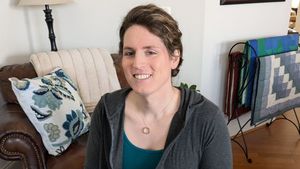









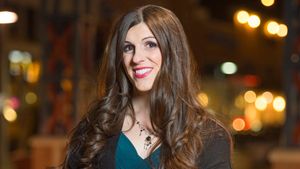



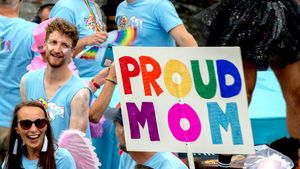















































Bullying Disproportionately Affects Black Youth Like Me — It Must Stop
This year on Spirit Day, let's not forget the experience of being young, Black, and queer in America.
Amiri Nash